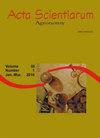抗胡萝卜乳杆菌的生物强化迷你生菜后代的选择。carotovorum
IF 1.2
4区 农林科学
Q3 AGRONOMY
引用次数: 0
摘要
巴西消费者越来越多地寻求独特的蔬菜产品,如迷你生菜。然而,它们的生产受到多种病原体的阻碍,包括胡萝卜乳杆菌亚种。导致生菜软腐病的胡萝卜菌。在本研究中,我们旨在筛选具有良好农艺性状和抗胡萝卜弧菌的生物强化迷你生菜基因型。采用随机区组设计,在大田和温室(UFU)进行12个处理,选择具有良好农艺性状(SPAD指数、茎和株径、茎长、株高、叶数、鲜重和抗栓病性)的生物强化迷你生菜。采用完全随机设计,共13个处理进行耐药或药敏试验。接种细菌悬浮液,评估如下:疾病严重程度,接种后16天;接种后4、8、12、16 d分别计算的疾病进展曲线下面积,以及所有评估日计算的数据之和;还有抗病班。基因型UFU 215#1和UFU 215#2的类胡萝卜素含量显著较高。基因型UFU 66#4、UFU 215#1和UFU 215#7表现出较高的抗栓性。所有基因型均对胡萝卜假单胞菌(P. carotovorum)分离物UFU A7具有抗性或中等抗性。本文章由计算机程序翻译,如有差异,请以英文原文为准。
Selection of biofortified mini lettuce progenies resistant to Pectobacterium carotovorum subsp. carotovorum
Brazilian consumers are increasingly seeking unique vegetable products, such as mini lettuces. However, their production is hampered by a wide variety of pathogens, including Pectobacterium carotovorum subsp. carotovorum, which causes soft rot in lettuce. In this study, we aimed to select biofortified mini lettuce genotypes with good agronomic traits and resistance to P. carotovorum. A randomized block design consisting of 12 treatments, conducted in a field and greenhouse (Federal University of Uberlândia [UFU]), was used to select biofortified mini lettuce with good agronomic traits: SPAD index, stem and plant diameter, stem length, plant height, number of leaves, fresh weight, and bolt resistance. A completely randomized design consisting of 13 treatments was used for resistance or susceptibility testing. The bacterial suspension was inoculated and the following were assessed: disease severity, 16 days after inoculation; area under the disease progress curve, calculated separately at 4, 8, 12, and 16 days after inoculation as well as the sum of data calculated on all the assessment days; and the disease resistance class. The genotypes UFU 215#1 and UFU 215#2 had significantly high carotenoid concentrations. The genotypes UFU 66#4, UFU 215#1, and UFU 215#7 showed high bolt resistance. All genotypes were classified as resistant or moderately resistant to the P. carotovorum isolate, UFU A7.
求助全文
通过发布文献求助,成功后即可免费获取论文全文。
去求助
来源期刊

Acta Scientiarum. Agronomy.
Agricultural and Biological Sciences-Agronomy and Crop Science
CiteScore
2.40
自引率
0.00%
发文量
45
审稿时长
>12 weeks
期刊介绍:
The journal publishes original articles in all areas of Agronomy, including soil sciences, agricultural entomology, soil fertility and manuring, soil physics, physiology of cultivated plants, phytopathology, phyto-health, phytotechny, genesis, morphology and soil classification, management and conservation of soil, integrated management of plant pests, vegetal improvement, agricultural microbiology, agricultural parasitology, production and processing of seeds.
 求助内容:
求助内容: 应助结果提醒方式:
应助结果提醒方式:


